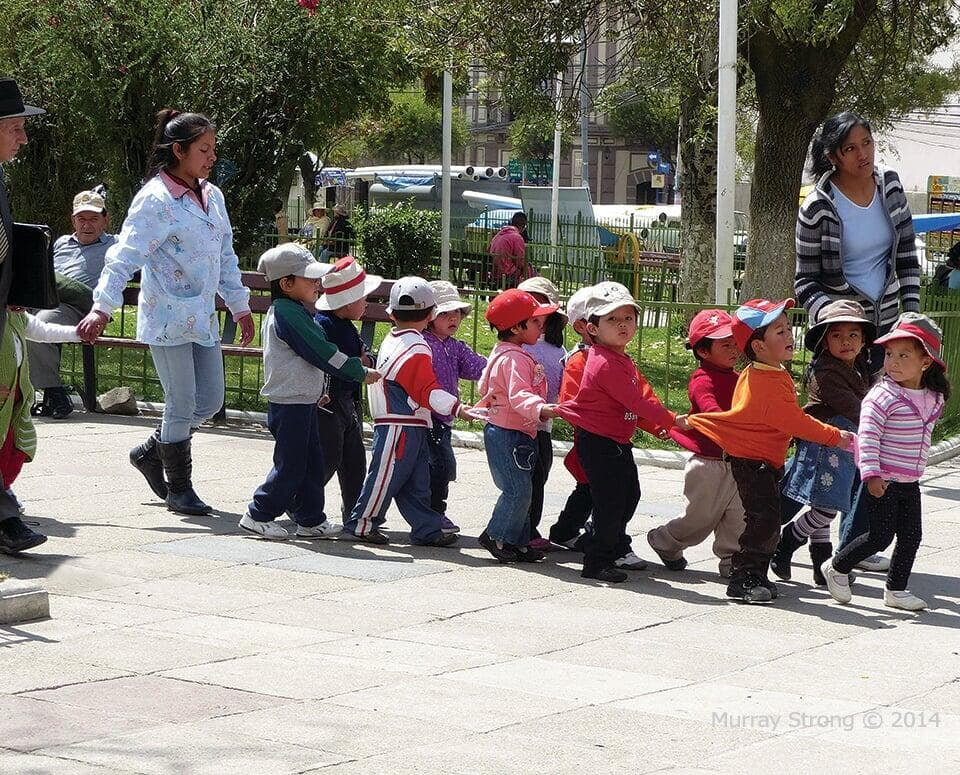Bolivia
Plurinational State of Bolivia Estado Plurinacional de Boliva Central South America AREA 424K mi2; 1.1M km2 [29th largest of 257 countries] ARABLE 4% POP 12.2M(29/mi2; 11/km2) [79th highest of 237 countries] GOV’T Presidential republic CAPITAL La Paz (1.9M) GDP/CAPITA $8,100 UNEMPLOYMENT 9% IN POVERTY 37% LIFE EXP 73 years MEDIAN AGE 26 yrs INFANT MORT 22/1K live births (73rd) LITERACY 93% LANGUAGES Spanish (official), and 36 official indigenous languages, including Quechua, Aymara, and Guarani RELIGIONS Roman Catholic 65%, Protestant and various Evangelical 20%, Adventist 3%, other 4%, atheist or agnostic 2%, none 6% HEALTH 8% of GDP EDUCATION 10% of GDP (5th) MILITARY 1% of GDP (127th) LABOR FORCE Agriculture 14%, industry 38%, services 42% PCVs 1962–1971, 1990–2008 CURRENT: 0; TTD: 2,693 |  Bolivia The chatter of a dozen preschoolers in the plaza mingles with the noise reverberating from La Paz’s streets and buildings. Early childhood education has grown in importance in recent years, along with an emphasis on teaching community and cross-cultural skills. But due to stressed economic conditions, Bolivia’s schools have problems maintaining staff, resources, and even students. Despite Bolivia’s firm commitment to education, as South America’s poorest country it cannot yet support universal access to secondary school. Many young Bolivians face insurmountable obstacles to continuing their studies.
Murray Strong © 2014 PCV Ecuador 1984–1987 Agroforestry |
Adult Books

By Rodrigo Hasbún, trans Sophie Hughes.
Publisher: Simon & Schuster; Unabridged edition (September 11, 2018)
Language: English
Paperback: 144 pages
ISBN-10: 150115480X
ISBN-13: 978-1501154805
Summary:
Inspired by real events, Affections is the story of the eccentric, fascinating Ertl clan, headed by the egocentric and extraordinary Hans, once the cameraman for the Nazi propagandist Leni Riefenstahl. Shortly after the end of World War II, Hans and his family flee to Bolivia to start over. There, the ever-restless Hans decides to embark on an expedition in search of the fabled lost Inca city of Paitití, enlisting two of his daughters to join him on his outlandish quest into the depths of the Amazon, with disastrous consequences.
About the Author:
Rodrigo Hasbún is a Bolivian novelist living and working in Houston. In 2007, he was selected by the Hay Festival as one of the best Latin American writers under the age of thirty-nine for Bogotá39, and in 2010 he was named one of Granta’s Best Young Spanish-Language Novelists. He is the author of a previous novel and a collection of short stories, two of which have been made into films, and his work has appeared in Granta, McSweeney’s; Zoetrope: All-Story; Words Without Borders, and elsewhere.
Affections received an English PEN Award and has been published in twelve languages.
Sophie Hughes has translated novels by several contemporary Latin American and Spanish authors, including award-winning Laia Jufresa and Rodrigo Hasbún. Her translations and writing have been published in The Guardian, The Times Literary Supplement, Literary Hub, and The White Review, among others. In 2017 Sophie was awarded a PEN/Heim Translation Fund Grant.
Praise for AFffections:
"In Affections, a family elegy is woven into an epitaph for the radical politics of South America and the result is an act of literary hypnosis you won't soon forget." —Adam Haslett, bestselling author of Imagine Me Gone“A dark, stunning novel, Affections is charged by a brilliant kaleidoscope of perspectives, the voices of exiles, a post-war German family in Bolivia. Hasbún has spun a tale of displacement, of political turmoil, in which the characters’ motives are as complicated as the Bolivian jungle they explore. It’s a fascinating book." —Lynne Tillman, author of American Genius, A Comedy
"It's hard to decide which character is more fascinating in Hasbún's masterful blend of history and fiction about a German family living in La Paz in the decades after the war. As the quick-paced narrative covers from the search for a lost city in the Amazon to the brutal guerrillas in the Bolivian jungle, the inner lives of each family member build up to enormous emotional payoff. This is sharp storytelling, both in the political and intimate fronts." —Daniel Galera, author of Blood-Drenched Beard
"This is a finely atmospheric book...It’s a work of sympathetic imagination, written with cool economy, elegance and understanding. It’s a reconstruction of real lives, real historical events, but Hasbún’s achievement is to make it perfectly fictional, which is to say truer than fact. I read it straight through first, with no idea of its historical truth, no knowledge of Hans Ertl beyond the name, no memory of the woman who in Hamburg assassinated the Bolivian diplomat who had been the policeman who ordered the hands of the dead Che Guevara be cut off. Learning of this made the second reading interesting in a different way, but didn’t enrich it. The truth of fiction of this quality is that it reminds you how much of life that really matters goes on in the mind and heart." —The Scotsman (UK)
"Though Hasbún's narrative is rooted in politics, its key strengths are his remarkable command of time and characterization. The novel is short but gallops across a half-century's worth of transformations in Bolivia, and sections narrated by individual characters are marked by a surprising depth of emotional detail given the story's brevity. . . A one-sitting tale of fragmented relationships with a broad scope, delivered with grace and power." —Kirkus Reviews (starred review)
"A compact and evocative historical novel. . .Hasbun has crafted an intriguing tale that ably bridges a pair of indelible historical moments. Lots of novels plumb the intersection of the personal and the political, but few have this kind of intellectual helf and emotional subtlety." —World Literature in Review
Kids' Books

By Claudia Bellante, illus. Anna Carbone
Publisher: Northampton, MA: Crocodile Books USA, 2022.
Format: unpaged; col illus.
ISBN: 978-1-62371-807-7
Age Range: 5-8 yrs.
Summary:
Noelia and Wara, two young Bolivian girls, both love to wrestle. Even though they are told it is a sport for boys, each week they put on their traditional costumes of the Cholitas and head for the ring. Later they both use the skills they learned in their training and in the ring to follow their dreams.
Films
Film: El visitante (The Visitor)
Director: Martín Boulocq
Release Date: 2022
Music
K'ala Marka: Mamita (en vivo)
Recipes
Bolivia Cultural Resources




